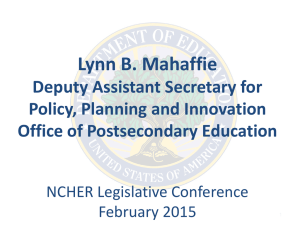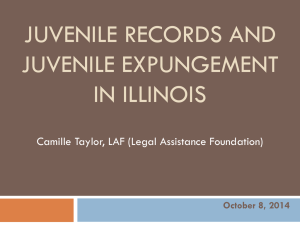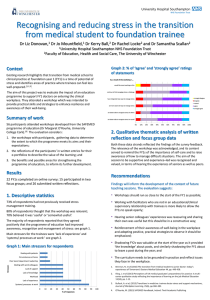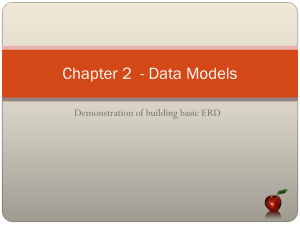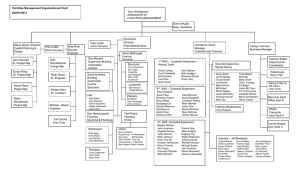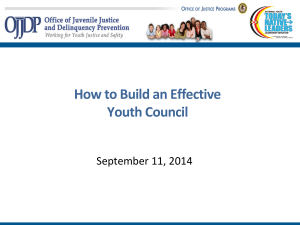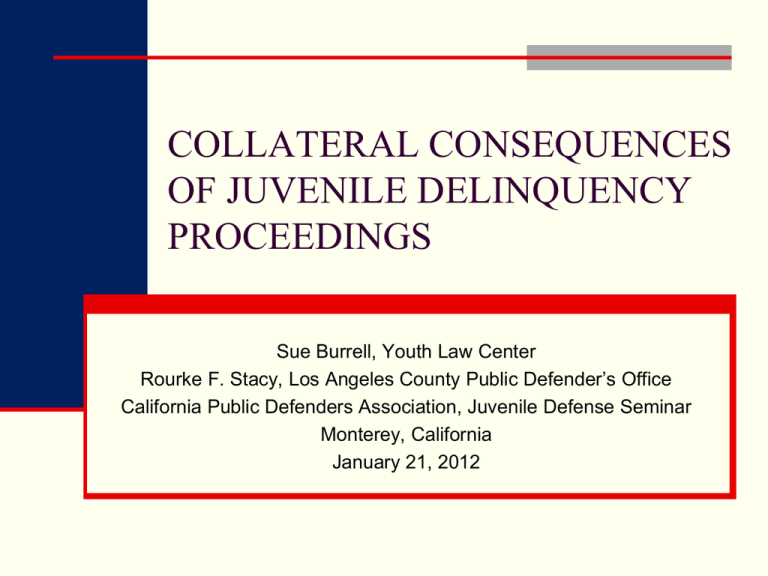
COLLATERAL CONSEQUENCES
OF JUVENILE DELINQUENCY
PROCEEDINGS
Sue Burrell, Youth Law Center
Rourke F. Stacy, Los Angeles County Public Defender’s Office
California Public Defenders Association, Juvenile Defense Seminar
Monterey, California
January 21, 2012
WHAT ARE COLLATERAL
CONSEQUENCES?
Collateral Consequences (CC) are the “other”
results of an arrest or an adjudication in juvenile
court:
Some CC occur in every case, others
occasionally
Some CC are not discovered until years after
juvenile court jurisdiction has terminated
Some CC have permanent and life-changing
effects
Sue Burrell & Rourke F. Stacy, CPDA Monterey (Jan. 21, 2012)
HISTORY OF JUVENILE COURT
First juvenile court was established in 1899 in
Cook County, Illinois
Within 25 years most states had a juvenile court
structure/system
Rehabilitation was the primary goal, not
punishment
Informal, non-adversarial and flexible
Cases treated as civil—not criminal [California
did not distinguish delinquents from other youth
in need until 1961]
Sue Burrell & Rourke F. Stacy, CPDA Monterey (Jan. 21, 2012)
HISTORY, CONTINUED
In 1909, Judge Julian Mack, one of the first judges to preside over the
nation’s first juvenile court in Cook County, Illinois, described the goals
of juvenile court:
The child who must be brought into court should, of course, be
made to know that he is face to face with the power of the state,
but he should at the same time, and more emphatically, be made
to feel that he is the object of its care and solicitude. The ordinary
trappings of the courtroom are out of place in such hearings. The
judge on a bench, looking down upon the boy standing at the bar,
can never evoke a proper sympathetic spirit. Seated at a desk,
with the child at his side, where he can on occasion put his arm
around his shoulder and draw the lad to him, the judge, while
losing none of his judicial dignity, will gain immensely in the
effectiveness of his work.
(Mack, The Juvenile Court (1909) Harvard Law Review, vol. 23, p.120)
Sue Burrell & Rourke F. Stacy, CPDA Monterey (Jan. 21, 2012)
WHAT HAPPENED?
The original ideal was not implemented:
Gross injustices occurred
U.S. Supreme Court extended rights to juveniles in
Kent v. United States (1966) 383 U.S. 541
In re Gault (1967) 387 U.S. 1
In re Winship (1970) 397 U.S. 358
But stopped short of extending all due process rights
in McKeiver v. United States (1971) 403 U.S. 528
Sentiments shifted toward “get tough” on juvenile crime;
adult crimes = adult time
Sue Burrell & Rourke F. Stacy, CPDA Monterey (Jan. 21, 2012)
PREVAILING MYTHS AND
PRESSURES
Social Scientists: We face an impending catastrophe
caused by violent juvenile predators; rehabilitation doesn’t
work
Police: Juveniles are more dangerous and youthful
behavior is an accurate predictor
Legislators: Juveniles need to be held accountable and
the public demands this accountability
Schools & Housing Authorities: We need to know about
delinquents to ensure safety
The Public: Juvenile court is not meaningful and kids are
let off easy; and anyway, all juvenile records are sealed
upon youth turning 18
Sue Burrell & Rourke F. Stacy, CPDA Monterey (Jan. 21, 2012)
THE RESULT
Significant direct and collateral consequences for
juvenile offenders
Increased stigma attached to juvenile court
involvement
Consequences that are short-term and long-term
The consequences cannot be easily rectified by
the juvenile court system
Consequences impact those that do not re-offend
Sue Burrell & Rourke F. Stacy, CPDA Monterey (Jan. 21, 2012)
WHY WE NEED TO CARE
Collateral consequences result from:
Zero tolerance school policies
Employment barriers
Eviction and homelessness
Sex offender registration
ALL OF THESE CONTRIBUTE TO THE
DESTABALIZATION OF YOUTH
Sue Burrell & Rourke F. Stacy, CPDA Monterey (Jan. 21, 2012)
DESTABILIZATION OF YOUTH
Drives youth into the underground economy
Pushes them towards cost/benefit analysis
that leads to higher risk activities for short
term benefits
Puts fragile egos at risk, exacerbates mental
health issues like depression
Causes delayed transitions or maintains
negative cycles
Promotes continued social exclusion and
stigma
Sue Burrell & Rourke F. Stacy, CPDA Monterey (Jan. 21, 2012)
LOST OPPORTUNITIES
CC prevent youth from achieving good outcomes; they
have an impact on education, income, health/longevity and
future criminality. Research has found:
Graduation rates are associated with increased public
safety
Urban areas with higher rates of employed teen females
have significantly lower teen pregnancy rates
Youth who work in their teen years are more likely to
work as young adults—this is critical for those who do
not go to college
Metropolitan areas with high teen employment rates
have significantly higher employment participation rates
for young adults five years later
Sue Burrell & Rourke F. Stacy, CPDA Monterey (Jan. 21, 2012)
LOST OPPORTUNITIES,
CONTINUED
Youth who work or go to school are less likely to
have police contact
Economically disadvantaged youth who work
during high school are less likely to drop out than
their non-working peers
African-American males who work between 2130 hours per week are more likely to graduate
from high school and attend college than their
peers with no paid work experience
Sue Burrell & Rourke F. Stacy, CPDA Monterey (Jan. 21, 2012)
MOST IMPORTANTLY
Long-term collateral consequences send the
message that rehabilitation is ultimately not
rewarded
The very “system” that is to “rehabilitate”
becomes the number one cause of permanent
consequences—this undermines the most
fundamental goals of the system
Some consequences are grossly
disproportionate to the “crimes”
The harm from consequences is real and
reduces public safety
Sue Burrell & Rourke F. Stacy, CPDA Monterey (Jan. 21, 2012)
WHAT ARE THE SPECIFIC
COLLATERAL CONSEQUENCES?
A Good Place to Find Out:
Collateral Consequences of Juvenile
Delinquency Proceedings in California: A
Handbook for Juvenile Law Professionals
Pacific Juvenile Defender Center (2011)
Sue Burrell & Rourke F. Stacy, CPDA Monterey (Jan. 21, 2012)
SPECIFIC CONSEQUENCES
CC include consequences associated with
confidentiality, court records, and public access to
juvenile proceedings
Specific CC of juvenile court involvement are very
broad, including future use of sustained petitions,
registration, issues associated with court ordered
therapy, immigration, financial obligations, parental
responsibility, education, college applications and
financial aid, employment, military service, public
housing, public benefits, firearm possession, travel
restrictions, and becoming an adoptive or foster
parent
Sue Burrell & Rourke F. Stacy, CPDA Monterey (Jan. 21, 2012)
IS IT A CRIMINAL CONVICTION?
No. Under California law, a delinquency adjudication
is not a criminal conviction (Welf. & Inst. Code, §
203)
Delinquency adjudications are nonetheless treated
like criminal convictions, especially in the eyes of the
public who do not understand the difference between
adult convictions and juvenile adjudications
An adjudication is considered a conviction for
purposes of California driving privileges (Veh. Code,
§ 13105)
An adjudication is considered a conviction by the
military
Sue Burrell & Rourke F. Stacy, CPDA Monterey (Jan. 21, 2012)
PUBLIC ACCESS TO COURT
PROCEEDINGS
Generally, juvenile hearings are closed to the
public (Welf. & Inst. Code, § 676). However, they
may be open if:
Requested by both the minor and his parent or
guardian who is present; or
The proceeding involves a serious offense listed
at § 676 (a); or
The court finds that a person has a direct and
legitimate interest in the case or the work of the
court
Sue Burrell & Rourke F. Stacy, CPDA Monterey (Jan. 21, 2012)
PUBLIC ACCESS,
CONTINUED
Up to two family members of a prosecuting witness, a
victim of the offense (subject to exclusion in certain
circumstances), and up to two support persons for
the victim may attend a juvenile court hearing
When the petition alleges certain specified sexual
offenses, the court may close the hearing to the
public either upon a motion made by a district
attorney, or during the victim’s testimony, if the victim
is younger than 16 (Welf. & Inst. Code, § 676 (b))
Sue Burrell & Rourke F. Stacy, CPDA Monterey (Jan. 21, 2012)
CONFIDENTIALITY
In general, delinquency adjudications and juvenile
court files are confidential (Welf. & Inst. Code, § 827)
If a youth is adjudicated on a serious offense listed at
§ 676 (a), the youth’s name will be made public,
unless the court makes a written finding on the record
that good cause exists to keep the name confidential
(Welf. & Inst. Code, § 676 (c))
The charging petition, minutes of the proceeding,
orders of adjudication, and disposition of the court
are publicly available, but no other documents in the
file may be viewed (Welf. & Inst. Code, § 676 (d))
Sue Burrell & Rourke F. Stacy, CPDA Monterey (Jan. 21, 2012)
CONFIDENTIALITY, CONTINUED
Pursuant to Welfare & Institutions Code § 827,
certain parties may petition the juvenile court for
permission to obtain confidential juvenile records and
upon request disseminate them in open court
Anecdotally, juvenile defenders are aware of
unintended individuals obtaining juvenile records
Sue Burrell & Rourke F. Stacy, CPDA Monterey (Jan. 21, 2012)
USE OF ADJUDICATIONS IN
SENTENCING
Adjudications trigger sentencing enhancements in
both state and federal criminal systems
Welfare & Institutions Code § 707 (b) offenses can
constitute “strikes,” which doubles future sentences,
and can lead to 25-Life
Used as a factor in aggravation
Used in Death Penalty Cases, SVP and for
Impeachment
Juvenile Adjudications qualify under the Federal
Armed Criminal Career Act
Sue Burrell & Rourke F. Stacy, CPDA Monterey (Jan. 21, 2012)
REGISTRATION
Adjudications may result in arson, gang and sex
offender registration
Sex offender registration may be relieved by
sealing but it is unclear whether relief is provided
for honorable discharge (There is no pardon or
certificate of rehabilitation for juvenile offenders)
Gang registration may result in CALGANGS
entry and have long lasting effect
Sue Burrell & Rourke F. Stacy, CPDA Monterey (Jan. 21, 2012)
SEX OFFENDER TREATMENT
Compliance with sex offender treatment
programs may result in additional charges being
filed due to disclosure of previous acts
Polygraphs may be administered and in some
cases a youth may be able to invoke his/her Fifth
Amendment privilege—however they may be
found non-compliant with the program
Sue Burrell & Rourke F. Stacy, CPDA Monterey (Jan. 21, 2012)
DRIVING
A sustained petition may affect a young person’s
eligibility to apply for a driver’s license, or may
result in the suspension or revocation of driving
privileges, depending upon the adjudicated
offense
Triggering offenses include but are not limited to:
driving offenses, alcohol and drug violations,
vandalism, truancy, and/or prostitution
Some consequences are mandatory, and others
are discretionary
Sue Burrell & Rourke F. Stacy, CPDA Monterey (Jan. 21, 2012)
DRIVING, CONTINUED
Some consequences originate from the court;
others are imposed by the Department of Motor
Vehicles (DMV) after transmission of court
documents; and still others may be imposed by
DMV without direct court involvement
Juvenile adjudications count as convictions for
purposes of driving privileges, Vehicle Code §
13105, and there are also a number of separate
provisions specifically directed at juveniles or
persons under the age of 21
Sue Burrell & Rourke F. Stacy, CPDA Monterey (Jan. 21, 2012)
IMMIGRATION
Contact with the juvenile justice system, even
without any adjudication of guilt, may lead to
referral to federal immigration authorities by local
police and probation departments; identification
and arrest by immigration authorities for
deportation; secure detention without the
possibility of release pending the outcome of
their removal proceedings; a bar to obtaining
legal status in the U.S.; statutory ineligibility or
denial of immigration relief; and/or deportation
Sue Burrell & Rourke F. Stacy, CPDA Monterey (Jan. 21, 2012)
IMMIGRATION, CONTINUED
Most criminal-based grounds triggering deportation or
inadmissibility (a bar to obtaining legal status) require
a conviction, and under federal immigration laws
juvenile adjudications are not considered
convictions. Nevertheless, arrests and juvenile
dispositions may have immigration consequences
because there are some immigration penalties
that do not require a conviction and are triggered
simply by “bad acts” or conduct alone. 8 U.S.C.
§§1227(a)(2) et seq. and 1182(a) et seq.
Sue Burrell & Rourke F. Stacy, CPDA Monterey (Jan. 21, 2012)
IMMIGRATION, CONTINUED
Offenses constituting “bad acts” include, but are
not limited to: drug trafficking (transfer, passage,
or delivery); drug abuse or addiction; violation of an
order of protection; sexual assault; behavior
showing a mental condition that is a threat to self or
others, including attempted suicide, torture, or
repeated alcohol abuse-related offenses; engaging
in prostitution (as the prostitute); or making a false
claim of U.S. citizenship
Sue Burrell & Rourke F. Stacy, CPDA Monterey (Jan. 21, 2012)
FINANCIAL BURDENS
Three distinct types of penalties: fines and penalties,
restitution and restitution fines
Practical reality is that poor families make choices
between basic life necessities and paying fines,
restitution and fees
Many youth feel helpless and this creates a cycle of noncompliance
Interferes in some cases with obtaining informal diversion
Parents also face significant financial consequences for
costs associated with legal services, detention or
placement, and probation supervision
Sue Burrell & Rourke F. Stacy, CPDA Monterey (Jan. 21, 2012)
EDUCATION
Juvenile adjudications may affect youth’s ability
to access secondary education---or it may
impact the quality of educational services
offered
Suspension, expulsion may occur
Referral to Continuation School, Community
Day Schools, Independent Study, etc.
Education interrupted, lesser quality of
education, issues with credits
Sue Burrell & Rourke F. Stacy, CPDA Monterey (Jan. 21, 2012)
COLLEGE AND FINANCIAL AID
Although many college applications do not
require disclosure of adjudications, some do,
and transcripts, etc. may reveal juvenile court
involvement
Some scholarships may be jeopardized
May impose limits on pre-professional
programs due to license restrictions
Federal or state financial aid is not
compromised unless there is an adult
conviction while receiving the aid
Sue Burrell & Rourke F. Stacy, CPDA Monterey (Jan. 21, 2012)
EMPLOYMENT
Significant consequences
Lack of precision between application
language and the law
Criminal records checks reveal sealed
information and employers and licensing
agencies receive information that should not
be released
Permanent and life-long consequences
Sue Burrell & Rourke F. Stacy, CPDA Monterey (Jan. 21, 2012)
MILITARY
Adjudications are convictions for purposes of
military applications and often require “waivers”success in obtaining waiver depends on the
branch of the military and current needs
The military looks at not only adjudications but
also traffic infractions, arrests, and dismissed
court charges
Past history of using drugs or alcohol or
receiving mental health treatment can affect
ability to enlist
Sue Burrell & Rourke F. Stacy, CPDA Monterey (Jan. 21, 2012)
PUBLIC BENEFITS/HOUSING
Adjudications may result in loss of housing or
public housing assistance; state and federal laws
have eligibility and termination provisions related
to an applicant or tenant’s involvement in criminal
activity
Housing providers obtain information in violation
of Welfare & Institutions Code § 827
Landlords and housing programs wrongly equate
contact with the juvenile justice system as
“criminal activity” leading to the loss of housing
Sue Burrell & Rourke F. Stacy, CPDA Monterey (Jan. 21, 2012)
Public Benefits/Housing, Continued
A juvenile adjudication rarely disqualifies a person
from receiving most public benefits
A person convicted in adult court for drug offenses
defined in 21 U.S.C. §802(6) cannot receive
CalWORKs, (§11251.3 and 21 U.S.C. §862a(d)(1)),
and possibly not receive General Assistance, if part
of an otherwise eligible CalWORKS family. (Welf. &
Inst Code, § 17000 et seq.)
However, aid to families while a youth is detained
may be affected
Issues with medical care in juvenile facilities
Sue Burrell & Rourke F. Stacy, CPDA Monterey (Jan. 21, 2012)
FIREARMS
There are consequences under state and
federal law
Under state law the consequence lasts until
the age of 30
This can impact future careers in both law
enforcement and the military
For instance, a simple battery can have a
consequence because it results in the inability
to have a firearm until the age of 30
Sue Burrell & Rourke F. Stacy, CPDA Monterey (Jan. 21, 2012)
VOTING AND JURY SERVICE
Juvenile adjudications do not impact the right
to vote or participation in jury service—
however juveniles convicted in adult court
face limitations of these rights
Sue Burrell & Rourke F. Stacy, CPDA Monterey (Jan. 21, 2012)
TRAVEL
Probation and parole conditions may impose
limits on youths’ right to travel within and outside
the country
Even after probation or parole has terminated,
travel to foreign countries could be impacted. It
is wise to check with the foreign consulate before
engaging in travel. In some cases reentry into
the U.S. may be delayed or disallowed
Gang injunctions may limit youth in certain areas
of their own neighborhood and enjoin otherwise
lawful conduct
Sue Burrell & Rourke F. Stacy, CPDA Monterey (Jan. 21, 2012)
FOSTER/ADOPTIVE PARENTS
Prospective foster parents, adoptive parents,
relative/kinship caregivers, and their household members
are subject to criminal background checks that may reveal
unsealed juvenile delinquency records (H&S Code § 1558
(a); 22 C.C.R. 89219); potential caregivers can be denied
approval for any criminal convictions in the household
While juvenile adjudications are not criminal convictions,
licenses or approval can be denied on the vaguer grounds
that someone in the home has engaged in conduct
inimical to the health, morals, welfare or safety of either an
individual or the general public (Health & Saf. Code, §
1558 (a)(2))
Sue Burrell & Rourke F. Stacy, CPDA Monterey (Jan. 21, 2012)
TERENCE HALLINAN
As a youth, Terence Hallinan had numerous
fighting related scrapes with the law, and he saw
the inside of both Marin County's and San
Francisco's juvenile hall on several occasions.
Eventually, when he was age 17, one of those
fights got him kicked out of Drake High School in
San Rafael, and made a ward of the juvenile court.
The juvenile court judge ordered young Hallinan
removed from Marin County for a period of one
year, allowing him to return home from Friday night
to Sunday evening to visit his family.
Sue Burrell & Rourke F. Stacy, CPDA Monterey (Jan. 21, 2012)
TERENCE HALLINAN,
CONTINUED
In a discussion of legislation that would
abolish confidentiality protections for juveniles
and, in some cases, forward their juvenile
arrest records to colleges to which they are
applying for admission, Hallinan was asked
what the implications would have been for
him if his juvenile record had been forwarded
to U.C. Berkeley or Hastings when he was
applying for admission, Hallinan replied, "I
guess I'd be a Longshoreman now."
Sue Burrell & Rourke F. Stacy, CPDA Monterey (Jan. 21, 2012)
WHERE DO WE GO FROM HERE?
Re-evaluation of how cases are initially filed
Re-evaluation of plea agreements
Re-evaluation of “rehabilitation time”
Re-evaluation of sealing
Much stiffer consequences for improper
disclosure of juvenile records
Additional Legislation? What would be the
criteria?
Sue Burrell & Rourke F. Stacy, CPDA Monterey (Jan. 21, 2012)
For further information, or to obtain Collateral Consequences of
Juvenile Delinquency Proceedings in California, please contact
the Pacific Juvenile Defender Center:
Web site: www.pjdc.org
E-mail: info@pjdc.org
To contact the presenters:
Rourke F. Stacy rstacy@pubdef.lacounty.gov
Sue Burrell sburrell@ylc.org
)



